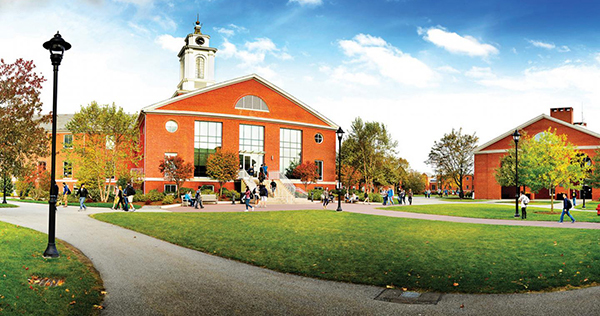Ms. Trust
Networks – those all-important relationships developed in business settings – have long been a subject of study. But recently, interest has developed in the different ways men and women set about networking.

Networks – those all-important relationships developed in business settings – have long been a subject of study. But recently, interest has developed in the different ways men and women set about networking.

Anyone looking for vivid lessons on women’s lives – from the impact of the beauty culture to wage inequalities to domestic violence – will find them in The Penguin Atlas of Women in the World (Penguin Books, 2009) by Professor and Chair of Global Studies Joni Seager.
Now in its fourth edition, the atlas uses eye-catching maps to present otherwise dry data. Previous iterations earned Outstanding Reference Book honors from the American Library Association and won the Chicago Geographical Society's Publications Award.

A growing proportion of all B-to-B transactions are facilitated by interorganizational coordination hubs (ICHs). How well do the participants in these hubs make key decisions about the way they work with each other through the hub — and interact with the organization that runs the hub?

You have probably heard the saying: “You know it is going to be a bad day at the office when the camera crew from 60 Minutes pulls into the parking lot ahead of you.” And the management of any organization might rightly worry that they could be the target of a “hatchet job” at the hands of one of the long-serving CBS correspondents.
But what about a case when the TV report is more like an accurate scalpel?

In our digital age, “skimming” has become a growing problem. Skimmers are small devices, installed by criminals on ATM machines, self-serve gas pumps and other devices to steal information from credit, debit or ATM cards.
According to the U.S. Secret Service, thefts from ATM skimmers now total more than $1billion/year. That number is expected to rise. In January 2013, two people were arrested in New Jersey and charged with skimming more than $1 million from ATM machines.

Hauling 60-plus pounds of geological gear up mountains. Purifying ancient marine shells for cutting-edge analysis. Rendering educational concepts into mathematical expressions. These professional-level adventures were the stuff of summer for three Bentley juniors.

Jonathan White calls hunger in the United States an invisible epidemic. His research on the subject includes interviews with 54 Americans who battle under-nutrition as a result of poverty; a survey of over 200 college students to assess their awareness of the issue and their beliefs about those who are hungry; and an intensive literature review of national and regional data. White tackles the issue in his forthcoming book, Hungry to Be Heard: Voices From a Malnourished America.

As a sociologist, Angela Garcia routinely fits together how and why people do things. What unfolds when someone calls 911? Takes part in a divorce mediation session? Visits an Internet chat room? Lately she has fixed on a real conundrum: process and motivation in the construction of jigsaw puzzles.

With the business model of the credit rating agencies in the news again, we wonder if there will be more than partial repairs.
Since U.S. Attorney Eric Holder filed suit against the market leader, Standard & Poor’s, seeking $5 billion in damages, we are about to find out.

Globalization. It’s the buzzword of a generation, but what does the term really mean? Ask a Chinese economist, a South African cinematographer, an American cultural anthropologist, and a Mexican migrant worker, and each is likely to give a different definition.